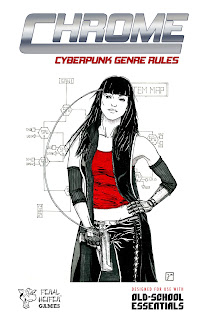Eleven. Years.
Eleven years ago (in just a few short days), on September 26, 2009, I posted to my older now-deleted blog about a crazy idea I had to write a game (Don't fret. All those must-read posts have been merged into this blog now.) Like so many others, I had and still have, a love for cyberpunk and R.Talsorian's Cyberpunk RPG, and even moreso for the "cyberfantasy" sub-genre so wonderfully created by FASA with the publication of their Shadowrun RPG in 1989. That melding of the near-future dystopia and (now-retro) tech of Cyberpunk with the fantasy tropes found in Dungeons & Dragons was, to steal a phrase, magical. The rich setting of Shadowrun drew my interest like a moth to a flame, far more than "pure" Cyberpunk ever did, to be honest. There was just one problem though - the rules were a hot mess. We tried to puzzle them out and play the game, without much success. We finally gave up and went back to D&D. Nowadays, ANY version is too detailed for my taste, for sure.
I make no bones about the fact that I just want to play D&D. The rules that is, not necessarily the setting. And on top of that, while I'll happily play the current 5th Edition rules, I have little interest in running that game. My loyalty and preferences still lie with the earlier editions I played in my youth. Lighter and more streamlined, easier to bend, fold and mutilate without one change here causing some unforeseen issue over there in another part of the game.
 |
Eleven years ago, my sights were set on Swords & Wizardry WhiteBox as my engine of choice. Even today, it's a strong game, lovingly adopted and adapted by it's fans. Versions exist for Sci-Fi (White Star), the Spy/James Bond genre (White Lies), World War II era gaming (WWII: Operation WhiteBox) and many other lesser know variations. All excellent in their own right. What I ultimately came to realize was that while that was a fine system, what I really wanted was good old B/X D&D. Over the intervening years, I also tinkered around with the more popular clones that emulate B/X - Labyrinth Lord and more recently, Advanced Labyrinth Lord, as well as Basic Fantasy RPG. Again, all fantastic games, but something kept holding me back. Enter Necrotic Gnome and Old-School Essentials (or OSE for short).
Much has been written by others much more eloquent than I, praising OSE. For those who haven't heard (where you been, kid?) OSE is a 100% accurate BX clone, published either as the single-volume tome I linked up above, or as a box set of five slim modular books. The material is presented in easy to use two-page spreads of information - an absolute stroke of genius in RPG layout and design. The five volume format consists of Core Rules (the BX engine, as it were), Genre Rules (genre-specific races, classes, equipment and so on), Spells, Monsters, and Treasures. As of this writing, the original five-book core set is "Classic Fantasy" - the original B/X material. Additionally, a recent Kickstarter campaign has also rounded out the "Advanced Fantasy" series of, again, Genre Rules, Spells, Monsters, and Treasures all drawn from AD&D. We've already seen preliminary PDFs and the new content is fantastic. Necrotic Gnome has also hinted at a future Post-Apocalyptic Genre book - think Mad Max more than Gamma World.
Herein lies our path forward. The design of OSE takes much of the work off my plate. There's no need to reiterate the core rules of gameplay - writing for OSE compatibility lets me merely reference relevant portions of those rules as needed. I can focus my creative energy on just the relevant bits needed for my cyberpunk and/or Shadowrun conversions. To that end, my current "plan" (and I use the term very loosely,) is to work on two separate OSE genre books: first, a "core" Cyberpunk book detailing the tech-based classes, cyberware, firearms and modern weaponry, how computers and hacking will work, vehicles and drones - all the trappings that fans of cyberpunk expect to see, and need to run their games. Secondly, a Cyberfantasy supplement which adds the rules for magical classes, fantastic races and the supporting rules and additional information to run a Shadowrun-inspired game. I hope that may satisfy fans on both sides of the magical divide. My goal is to keep both volumes very generic in terms of setting, which should allow them to be used with material from other publishers, whether that be the Seattle sprawl of Shadowrun, Cyberpunk's Night City, or New Angeles from FFG's Android universe.
What else to say for now? Not much, I'd guess. Time to put up or shut up. Eleven years of thinking and talking about a thing is too long with nothing to show for it. I want to make this a reality, so time to git'r done.
Finally, a tip o' the hat to user @Seph on the Old-School Essentials Discord server for cluing me in to the term "cyberfantasy" to so clearly describe Shadowrun. Much neater than lesser terms like Urban Fantasy have felt to me. Cheers mate!








